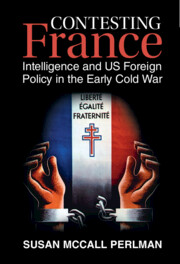'Perlman offers a revealing examination that decenters Washington and instead provides a deeply researched and beautifully written transnational and trans-imperial history. She recognizes that foreign policy is rarely the result of one voice. Instead, she highlights the myriad of voices, which jockeyed for position within and among, the various government agencies, and countries. This is intelligence history at its best.'
Sarah-Jane Corke - Co-Founder and Past-President of the North American Society for Intelligence History and Associate Professor at the University of New Brunswick
'Although intelligence remains international history’s ‘missing dimension,’ Perlman joins a small cadre of scholars committed to filling in the gap. Based on prodigious research in multinational archives, her innovative and masterful Contesting France enhances and complicates our understandings of early cold war history and intelligence’s pivotal yet problematic contribution to it.'
Richard Immerman - author of The Hidden Hand: A Brief History of the CIA
'By applying a 'trans-imperial' approach to the role of intelligence, Contesting France delivers an innovative, intricate, and convincing insight into the early Cold War. By placing emotion central to the narrative, this book demonstrates just what is possible with a 'new diplomatic history' approach to international relations. An exceptional achievement.'
Giles Scott-Smith - Roosevelt Chair in New Diplomatic History, Leiden University
'In this exceedingly well-written and argued book, Perlman’s assessment of American anxiety indicates that US intelligence officials had little grasp of internal French political stability, French nationalism, and independence movements in French colonies. This book could not be more relevant in urging us to think about how we gather, use, and abuse intelligence to achieve foreign policy goals.'
Kathryn C. Statler - author of Replacing France: The Origins of American Intervention in Vietnam



